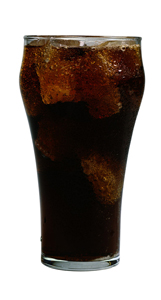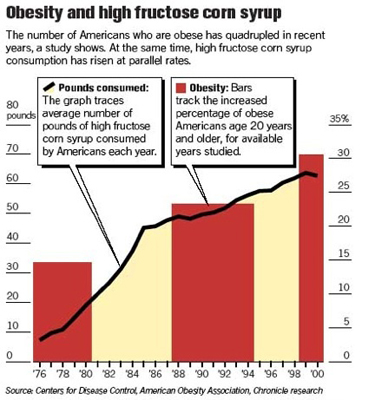The New York Times published this week a new study examining how the sugars glucose and fructose metabolize differently in the body, with fructose quickly converting to fat.
 This study, with a very small sample size, consisted of only six healthy, normal weight individuals, showed that the body quickly converts fructose to body fat. In this study, the researchers gave the participants a morning feeding of one of three different drinks. Both the researchers and the participants were unaware of which drink they were given. One group received a breakfast drink consisting of 100% glucose, another group received half glucose and half fructose drink; and the third group consumed a 25% glucose and 75% fructose drink. Four hours later, the participants consumed a regular lunch.
This study, with a very small sample size, consisted of only six healthy, normal weight individuals, showed that the body quickly converts fructose to body fat. In this study, the researchers gave the participants a morning feeding of one of three different drinks. Both the researchers and the participants were unaware of which drink they were given. One group received a breakfast drink consisting of 100% glucose, another group received half glucose and half fructose drink; and the third group consumed a 25% glucose and 75% fructose drink. Four hours later, the participants consumed a regular lunch.
The results showed that lipogenesis was significantly increased in those participants that consumed the drinks with fructose (lipogenesis is the process by which sugars are converted into fat). The researchers found that the groups that were given fructose at breakfast were more likely to store fats eaten at lunch. The researchers did note that this study may underestimate the fat-contributing effect of fructose on these participants because they were all healthy, lean, normal weight individuals; noting that this effect may be intensified in overweight individuals.
The researcher’s bottom line of this study was that fructose very quickly gets made into fat in the body. However, the main researcher, Dr. Elizabeth Parks associate professor of clinical nutrition at the University of Texas Southwestern Medical Center in Dallas, wanted to make a point of saying that people should not limit the amount of fruit they eat. Although fruit does contain fructose, it also contains essential vitamins, minerals, and fiber, which are vital to our diet and health.
 In this article, Dr. Parks made a great point by saying that “There are lots of people out there who want to demonize fructose as the cause of the obesity epidemic. I think it may be a contributor, but it’s not the only problem. Americans are eating too many calories for their activity level. We’re overeating fat, we’re overeating protein and we’re overeating all sugars.” This is so true… too often we get distracted and try to find one thing to blame for making us overweight or obese, but often it is multiple factors. Excessive amount of calories and fat consumed mixed with a sedentary lifestyle is the perfect formula for disease and obesity.
In this article, Dr. Parks made a great point by saying that “There are lots of people out there who want to demonize fructose as the cause of the obesity epidemic. I think it may be a contributor, but it’s not the only problem. Americans are eating too many calories for their activity level. We’re overeating fat, we’re overeating protein and we’re overeating all sugars.” This is so true… too often we get distracted and try to find one thing to blame for making us overweight or obese, but often it is multiple factors. Excessive amount of calories and fat consumed mixed with a sedentary lifestyle is the perfect formula for disease and obesity.
Fructose, which is the sweetest of all sugars, occurs naturally in fruits and honey; other sources include products as soft drinks, ready-to-eat cereals, and desserts that have been sweetened with high-fructose corn syrup (HFCS). Now you may be asking yourself, how do I limit or avoid eating these HFCS filled foods? A big thing that will help is reading the food label to see if HFCS is listed as an ingredient (you’ll be amazed to the amount of foods that contain HFCS). Also, I may sound like a broken record here, but you need to avoid or limit the amount of processed foods you consume of a daily basis, consume no or less soda, choose fresh fruit rather than fruit juices, buy 100% fruit juice instead of fruit-flavored drinks, and if you purchase canned fruit pick the ones canned in its own juices rather than the fruits canned in thick, heavy syrups.

no, a person is to blame for his/her own weight gain.
Thanks for sharing this story, Kinsey. Fructose definitely plays a part- considering corn syrups and sugars are packed in to most of the foods that are so readily available. It’s definitely up to individuals to read their food labels and make the choice to leave it or eat it.
Dr. George Bray is a real heavyweight in the field of obesity (pun intended). He is Boyd Professor at the Pennington Biomedical Research Center in Louisiana. Dr. Bray tends to blame the obesity epidemic on overconsumption of fat and fructose.
Personally, I agree with your quotes from Dr. Parks.
-Steve Parker, M.D.
Thanks Steve. Too many people try to find “the one thing” to blame for weigth gain. I strongly believe its about a person’s lifestyle and the choices they make (on diet, exercise, etc.).